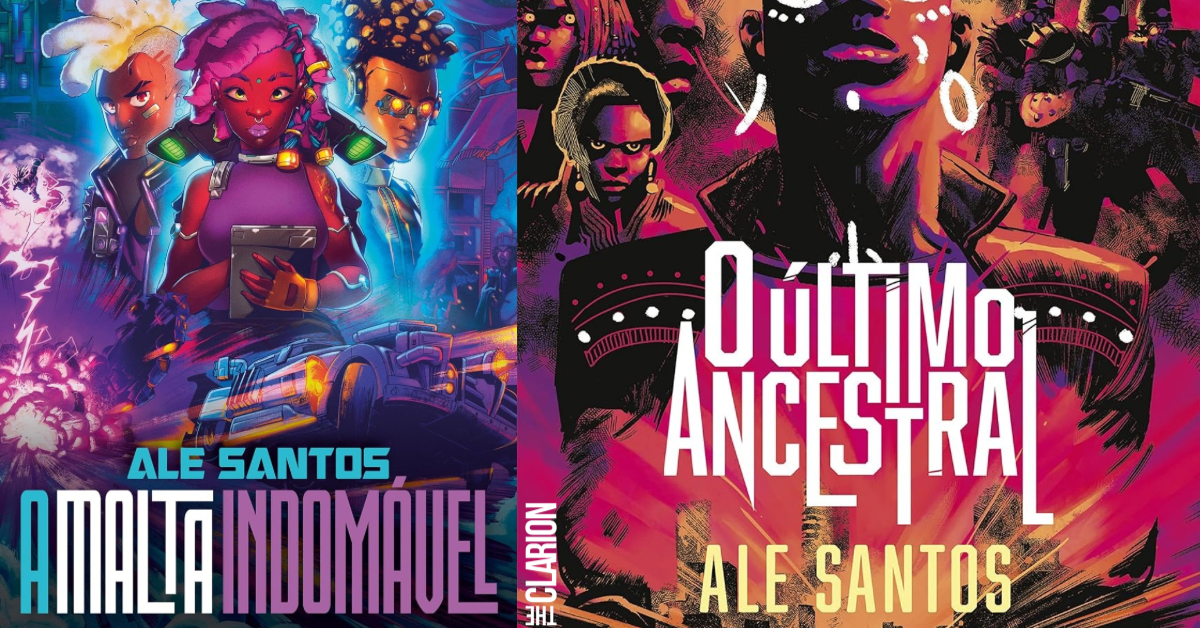On the cover of comics and the interiors of many a book a quiet revolution has taken place. Its not quite the British invasion that hit airwaves in the 60s. In fact, it’s far from an invasion with its negative undertones, and more of a wave of creativity that is adding one country’s flavor to the international mix.
While Latin America has a long history of literature and comics that have taken the world by storm; Brazil in particular is having a seismic impact on the comic landscape outside its borders. Nearly every publisher of note in the states hosts a share of Brazilian talents. It’s a story of opportunities being seized and the sharing of new narratives, some more important now than ever before.
“I shouldn’t be a writer, kids from the small town I come from don’t get opportunities like that and didn’t have access to them,” said author Ale Santos. “Fantasy and fiction saved me from bullies, bullying, and racism, so I dove into it, with the books I found in libraries. They were the classic works such as Verne, Wells, and Asimov. Over time, I discovered RPGs and Tolkien. I wrote for fun on a blog until in 2013 I represented Brazil in an international Sci-Fi anthology.”
Santos, from the Sao Paulo town of Cruzeiro, has long been a sensation in Brazil despite his youth. But navigating the world of publishing would prove a challenge, one many creatives this side of the Atlantic can empathize with. Instead of giving up, he worked other jobs while continuing to write and study literature, screen writing, and comics.
Santos said, “Here, the last decade has brought about significant social changes, and I’ve been a part of that, even without knowing. I was my grandmother’s first grandchild to attend college, thanks to government affirmative action, and these changes made me more aware of the impact the representation of people like me had in literature and entertainment. I became an informal researcher of Afro-Brazilian culture and history.”
This experience inspired him to take to Threads, where his stories would go viral. His posts would be collected into his first book, “Rastros de Resistencia”, which earned him a first nomination for the Jabuti award, Brazil’s highest literary honor, a spot on the UN’s recommended reading list, and placement within public libraries across the State of Sao Paulo.
“Our stories are extremely powerful and culturally rich; we need to work with determination so that the whole world recognizes the personality of our own fiction and fantasy.”
– Ale Santos
“Being a writer in Brazil is still very challenging, but I’m keen on inspiring others on this path, especially young people with a similar background to mine. That’s why I dedicate myself to working hard to make my mark in Latin American science fiction history,” Santos told The Clarion.
In the years since his debut, many awards and accolades have followed, including praise from the BBC and New York Times. Soon he’ll be on American shelves when “Assassin’s Creed Visionaries” is released. While it may seem like he is a new addition to the wave, Santos is far from alone.
Even among Brazilians that have cut their teeth at major publishing houses like Marvel and DC such as Mike Deodato Jr and Gabriel Ba, Marcelo D’Salete stands out. An Eisner-award in 2018 for “Run For it: Stories of Slaves Who Fought For Their Freedom” certainly helps. Today, while acclaimed in Europe and the US, the decorated illustrator and professor has never strayed from his roots.
“Comics as a medium is reasonably old in Brazil, dating as far back as the mid-19th century. So, we have a large number of artists dealing with different themes and narrative possibilities. This has increased in the last decade,” D’Salete told The Clarion.
Like Santos, he fell in love with comics at a young age and sees the surge in Brazilian talent succeeding abroad as down to a few things. Namely, quality, content, and an interest in a country that remains mysterious to many people.
“The publication of these works is recognition of their quality as well as the interest abroad in learning more about the Brazilian artistic, social and historical context,” D’Salete added. “Latin America has a deep connection with indigenous and African peoples. This is a universe that still needs to be researched, unraveled and imagined through comics. The medium of comics is playing a relevant role in bringing new possibilities for reading this unique mélange of cultures.”
It’s a factor Santos is eager to pursue. Despite their differences, he sees an opportunity for cultural exchange between the US and Brazil through the work of Afrofuturists like himself. For years, it happened in the form of music, Bossa Nova and Sergio Mendes heading one-way and Hollywood and jazz the other.

“Comics have had a huge impact here in my country, as they have helped turn some dark periods of our history into inspiration for people around the world in the modern day,” Santos said. “Culturally, expressions like samba, funk, religious festivals, regional myths, and our own cuisine are the foundation of my stories. I can’t wait to share as many of them as I can with a US audience.”
In a changing world this influx of entertainment and cultural exchange only makes sense. Through streaming services, publishers of translated works like The Witcher, and video games new narratives are being discovered and enjoyed. Santos believes this is one reason Brazil has become a new storytelling hub.
“I believe lovers of fantastic stories and good fiction enjoy exploring new narrative worlds and Brazil is a country full of narratives and perspectives that are still not often explored in North America. Globalization, promoted by the internet among other things, has created new possibilities for storytellers worldwide to engage audiences, it’s a great opportunity for creators like me,” Santos said.
While veterans like D’Salete have helped pave the way, they aren’t resting on their laurels either. Hard work has been key to bringing voices that often went unheard to platforms the world over. As talented creatives in Brazil continue to push boundaries and build bridges, global literature and comic books have a lot to look forward to.
“Our stories are extremely powerful and culturally rich; we need to work with determination so that the whole world recognizes the personality of our own fiction and fantasy,” said Santos.
If Santos’ dedication to his craft is any indication, lovers of good storytelling and art will be eating well for years to come.
(Featured Image credit to Harper Collins)
Written by Ismael David Mujahid, Executive Editor
- More Knowledge is More Savings: Taking Charge of One’s Benefits
- An Inside Look at Dayton’s Funniest
- Must-Watch films to binge for Women’s History Month
- Charity Earley: A Way Maker in Times of Hardship
- The Significance of Women’s History Month

